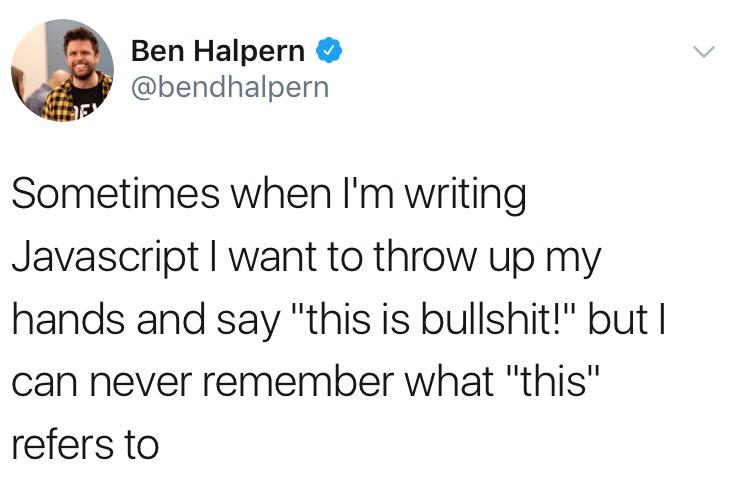Ranter
Join devRant
Do all the things like
++ or -- rants, post your own rants, comment on others' rants and build your customized dev avatar
Sign Up
Pipeless API

From the creators of devRant, Pipeless lets you power real-time personalized recommendations and activity feeds using a simple API
Learn More
Comments
-
 mr-user12696yWhat I don't like about javascript is that it always try to please other and can't say no.
mr-user12696yWhat I don't like about javascript is that it always try to please other and can't say no.
Even if you try to make it do something which doesn't make sense, it always try to give the output somehow.
I try to include the type information in variable name to prevent such problem. -
 theuser46526y@mr-user That was pretty much done back in the 90's because even though some dev would write a ballsed up onClick event, the page wouldn't throw an error and go tits up on the users. Other parts of the page would still be usable.
theuser46526y@mr-user That was pretty much done back in the 90's because even though some dev would write a ballsed up onClick event, the page wouldn't throw an error and go tits up on the users. Other parts of the page would still be usable. -
 devGaara626y@theuser ah.. I see.. they wanted to make js tolerable and ended up with quite opposite
devGaara626y@theuser ah.. I see.. they wanted to make js tolerable and ended up with quite opposite -
 theuser46526y@24th-Dragon Not sure what you're trying to do. First example is just 0 + 1. If you store "", then post increment, it will be 1.
theuser46526y@24th-Dragon Not sure what you're trying to do. First example is just 0 + 1. If you store "", then post increment, it will be 1.
So
let x = ""
x+++true -
 hitko29956yNewsflash, most languages store boolean values as 0 and 1 (actually all languages, since, you know, computers operate in binary)... Now, how much is 1 + 1? That's right, 2.
hitko29956yNewsflash, most languages store boolean values as 0 and 1 (actually all languages, since, you know, computers operate in binary)... Now, how much is 1 + 1? That's right, 2. -
I'm not into javascript but I've already seen that true+true=2 thing once in code. I understand it but my strongly-typed mind hurts 😆
-
@theuser jokes on you, you are just doing
(x++) + true.
Which changes the variable to a number (since it was empty string -> 0)
And then post increment operator bla bla.
Executing same line again gives different results that way. -
 theuser46526y@vorticalbox True, although it is probably a better idea to box the values for the sake of clarity.
theuser46526y@vorticalbox True, although it is probably a better idea to box the values for the sake of clarity.
Boolean("1") //true -
And why would one add boolean to number, again? Aren't you supposed to multiply them? I mean, lol, it's pure logic, how long you can go with type inference if you make such confusing operations :)
EDIT: Oh, it's an interview question? Well, then my complaint is addressed to interviewer, because they lack logic. -
 hitko29956yHere's a cute use case: you've got 3 boolean variables, and you need to know if at least 2 of them are true.
hitko29956yHere's a cute use case: you've got 3 boolean variables, and you need to know if at least 2 of them are true.
You can just write (var1 + var2 + var3) >= 2.

 This never gets old...
This never gets old... Exactly
Exactly ¯\_(ツ)_/¯
¯\_(ツ)_/¯
Today I found out that
true + 1 is 2 in js
rant
javascript